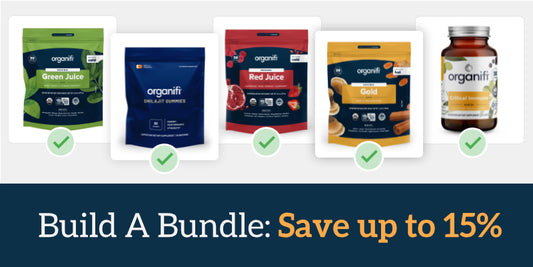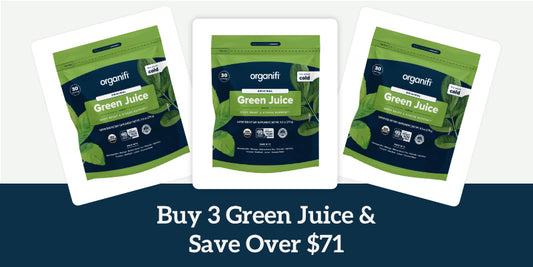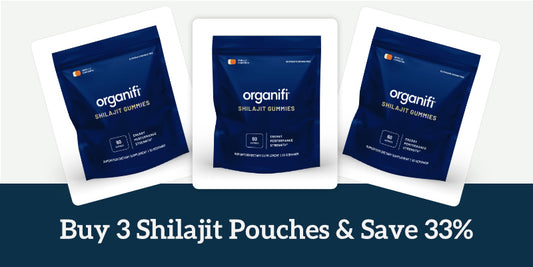Chocolate antioxidants, life’s most beautiful miracle or most dangerous lie?
You’ve heard it “chocolate is full of antioxidants,” “chocolate comes from a plant, it’s basically a salad,” “chocolate can keep you young,” but also “you gotta watch your sugar intake” and “there’s so much sugar in chocolate.”
What gives?
If you’re confused about chocolate antioxidants, want to know more about healthy chocolate substitutes, and if there is even such a thing as healthy hot chocolate - you’re in the right place.
We’re here to debunk the myths surrounding chocolate antioxidants, explain what antioxidants are in the first place (and how they keep you young) and give you some insider tips on how to curb sugar cravings, while satisfying your sweet tooth.
Yes, you can have it all - and this is the place to get it. Calling all chocolate lovers, it’s time to settle once and for all if chocolate is healthy or not!
Chocolate Antioxidants and Healthy Aging
It’s Healthy Aging Month, the perfect opportunity to learn more about natural aging and how to make that process more comfortable for us, decade by decade.
We know you’re here to learn about chocolate antioxidants, but do you know why antioxidants are important in the first place?
Antioxidants act as aging retardants by helping preserve our body’s molecular structures intact for longer. However, antioxidants cannot permanently stop aging - or we’d have found the fountain of eternal youth already.
(Also, we would probably be munching a lot more on those chocolate antioxidants, am I right?)
The Aging Process:
The book Evolutionary Biology of Aging defines aging as “a persistent decline in the age-specific fitness components of an organism due to internal physiological deterioration.”
That deterioration can have intrinsic or extrinsic origin: the intrinsic or internal causes are due to natural and inevitable chronological physical changes, while the extrinsic ones come from exposure to water, sun, air, and nutrition.
We can control, to a certain degree, how we age.
Yes, aging is inevitable (and that’s a good thing), but we can influence how fast and impactful that process can be by influencing the external factors we can control - diet, sun exposure, and hydration.
So, where do chocolate antioxidants come in?
Research shows that cellular oxidation due to “free radicals,” which are unstable molecules that attach themselves to healthy ones disrupting and damaging the latter, is one of the leading causes of rapid aging.
Free radicals are naturally produced when we exercise and as a byproduct of the processes that turn food into energy; meaning, they will always exist in the body and we can’t stop them - but we can neutralize them with antioxidants.
Your body produces antioxidants naturally and is designed to remove those free radicals, but sometimes the amount of food, environmental toxins, and stimuli is too much and that turns into “oxidative stress.”
Oxidative stress is linked to most chronic illnesses and is one of the main causes of extrinsic aging today. This is why antioxidants, like the ones from chocolate, are important!
What Are Antioxidants?
Any substance that inhibits cellular oxidation is an antioxidant, they are often called free-radical scavengers” because they seek and neutralize these wasteful substances before they can do any or more harm. They are both produced by the body and found in food.
You can get more antioxidants in your body with antioxidant foods and supplements. Some popular and well-known antioxidants are Vitamin C, Vitamin E, Vitamin B, beta-carotene, selenium, manganese, etc.
Chocolate Antioxidants
Chocolate, almost everyone’s favorite snack, can be a nutritious source of antioxidants - yes chocolate has antioxidants! However, not all chocolate is created equal; to get the health benefits of cacao and those chocolate antioxidants in your system, your go-to candy bar won’t do it.
A comprehensive study on the antioxidant properties of over 3,100 foods published by the Department of Nutrition of the University of Oslo, found that “there are several thousand-fold differences in the antioxidant content of foods. Spices, herbs, and supplements include the most antioxidant-rich products, some are exceptionally high.”
According to their research:
Berries, fruits, nuts, chocolate, and vegetables, have the highest antioxidant values, and there are up to 15 mmol of antioxidants per 100 grams of dark chocolate (70%+).
That is more than blueberries and raspberries, which contain up to 9.2 and 2.3 mmol of antioxidants per 100 grams respectively. Further research by the USDA database found that chocolate antioxidants are also present in milk chocolate, chocolate syrup, cocoa powder, and more, but in significantly lower quantities - almost negligible.
This is why it’s important to understand that cacao, dark chocolate, and milk chocolate are not the same, and won’t contribute in equal amounts to your health and graceful aging goals.
Chocolate contains more antioxidants and polyphenols than some fruit juice, but only when the percentage and concentration of the cacao seeds were higher than the other ingredients.
The science is clear, but we’re here to make it even simpler. Let’s go over chocolate antioxidants per serving, recommended doses, how to tell which chocolate is best, a good chocolate substitute and how to curb sugar cravings (hint: it’s not with white chocolate!)
How to Get Chocolate Antioxidants in Your Diet
To get the anti-aging, brain-boosting, and serotonin-activating health benefits of chocolate, all you need to do is mind your consumption - you can even have a little every day.
If you’re opting for a daily dose of chocolate antioxidants:
- Stick to under 6 grams or 0.2 ounces as a serving per day
- You’ll get 0.9 mmol of antioxidants per 6gram serving
- Choose the darkest chocolate option available
- Look for bars with 70% cacao or more
- Read the ingredients; cacao should be the first
- Make sure if sugar is present, it’s the third or fourth ingredient minimum
- Avoid white chocolate, as you’ll barely get any of the benefits
- Consider a conflict-free, fair-trade and organic source
- Avoid “Dutched” dark chocolate, which reduces the “bitter” taste and kills the good flavonoids in the process
- You can have a maximum of 1-2 Oz or up to 28 grams in a day - any more is too much!
- Don’t rely entirely on chocolate antioxidants!
Healthy Hot Chocolate May Be Better Than Tea
How to curb sugar cravings? Maybe not with a Mars bar, leave that for a special day! Instead, have a cacao-heavy chocolate substitute like our healthy hot chocolate.
We’re not just trying to sing the praises of our Gold, Chocolate (although we admit we are biased by its killer flavor and low sugar content), we’re just letting you know that a study by the University of Cornell found that healthy hot chocolate could boost the antioxidant levels in your body even more than tea when compared using the same serving sizes and conditions.
We recommend this chocolate substitute as a way to curb that sweet tooth and still get all the delicious benefits of the Aztec's greatest gift to our civilization.
Why Consider Gold, Chocolate as Your Healthy Hot Chocolate?
A seasonal version of our signature Gold tea, it’s a fantastic chocolate substitute that is chock-full of antioxidant-rich foods, inflammation-fighters, maximum strength turmeric, and the anti-stress mushroom by excellence Reishi.
It’s incredibly relaxing, remarkably chocolaty, and so -so- satisfying. Although the predominant flavor is chocolate through its cacao content, you also get the health benefits of ginger, curcumin, Reishi, Turkey tail mushroom, coconut milk, cinnamon, and the acacia fiber prebiotic.
What could be a better chocolate substitute? Maybe one of these ideas how to curb sugar cravings.
How to Curb Sugar Cravings
You can get your antioxidants and get your sugar fix with the following tips:
- Try to have healthy hot chocolate or chocolate substitute that’s rich in cacao
- Have a cup of Gold, Chocolate!
- Take your 6 grams of 0.2 ounces of dark chocolate and crumble or grate over sugar-free coconut yogurt and fresh raspberries
- Have a glass of water and check your feelings, are you craving sugar or managing stress? Try conscious eating
- Go for a healthy chocolate protein brownie
- Enjoy a chocolate chia pudding
Bottom Line:
As doctor Chang Yong Lee, Ph.D. said in his Cornell paper, "although we know that antioxidants are important for good health, nobody knows the exact daily amount required per person." The best anti-aging diet is a balanced one, full of fruits, vegetables, and antioxidant-rich foods that support healthy aging and fight oxidative stress.
Chocolate antioxidants are a fantastic alternative, and our Gold, Chocolate is full of them, but it’s not good to take this knowledge as an excuse to abuse your favorite Hershey’s bar. Instead, think of it as an incentive to get more creative with cacao, try organic dark chocolate recipes and stay healthy.
If you’re interested in more tips to age healthily, for Healthy Aging Month, we’re publishing a few pieces on how to get the best nutrients for timeless skin and young-feeling bodies. Remember: aging is a beautiful gift and we’re in this together.
Now go have some dark chocolate! (And maybe save us some?)




